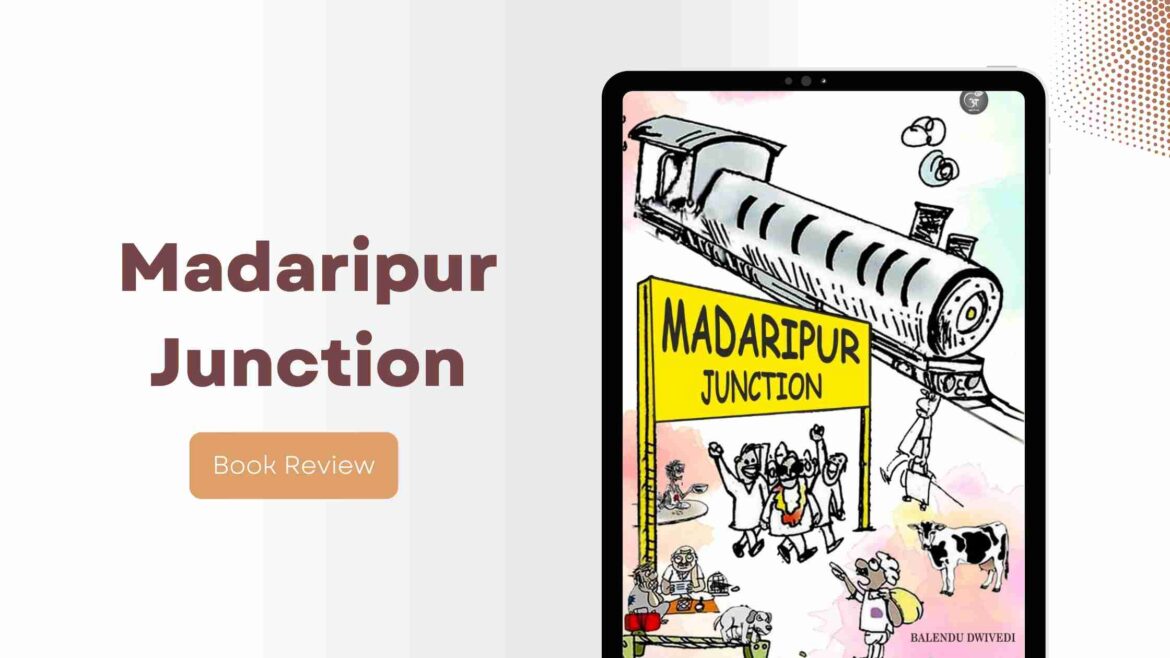Very few books in today’s writing have the flavour that comprises both commentary as well as meaning for the society they are being written. This is a special feature that has distinguished authors throughout different times and eras. “Madaripur Junction” by Balendu Dwivedi is a riveting and provocative novel set in the rural landscape of eastern Uttar Pradesh. It is an incisive social commentary that critiques the entrenched caste and religious hierarchies that pervade Indian society. Dwivedi’s storytelling prowess is evident in his ability to intertwine the absurdities of village life with the poignant struggles for social justice, creating a narrative that is as enlightening as it is engaging. It carries the essence and flavour of Indianness that is not only in the soil but in the blood of people and has been more or less similar throughout generations.
At the heart of the novel lies the fictional village of Madaripur-Junction, a microcosm of social anomalies and peculiarities. The village is dominated by characters with madari (charlatan) tendencies, reflecting the absurdities and hypocrisies of their milieu. Central to the plot are Chhedi Babu and Bairagi Babu, representatives of the so-called upper caste. These characters, along with their cohorts, embody the entrenched power structures and moral decay prevalent in the village. Dwivedi uses these characters to critique the corruption, deceit, and manipulation that underpin the social fabric of Madaripur. These characteristics not only make the novel a relatable tale of reality but also carry the potential to push the readers into the analytical mode as a detached observer.
The novel is particularly effective in its portrayal of the social stratification and the resulting tensions between different castes. The upper caste characters, with their unscrupulous behavior and machinations, are juxtaposed against the lower caste individuals who are gradually awakening to their rights and fighting for socio-political equality. Chaita, a key character representing the lower caste struggle, epitomizes this awakening. His journey, fraught with challenges and conspiracies, highlights the systemic oppression faced by marginalized communities. Chaita’s struggle and ultimate sacrifice serve as a powerful narrative arc that drives the story forward. His character is a symbol of resistance against the oppressive caste system, and his tragic end underscores the harsh realities of village politics and the lengths to which the powerful will go to maintain their dominance. The aftermath of Chaita’s death, where his wife Meghiya and their community continue his fight, adds a layer of resilience and hope to the narrative. Their collective efforts to seek justice and equality, despite facing cunning conspiracies, resonate deeply with the reader.
Dwivedi’s intention to expose and critique these social injustices is clear and compelling. He paints a vivid picture of rural life, weaving an intricate tapestry of the village’s environment and its inhabitants. The authenticity of his descriptions immerses the reader in the setting, making the characters and their experiences feel both familiar and relatable. The detailed depiction of Madaripur-Junction serves as a backdrop against which the broader themes of caste, power, and resistance are explored. One of the strengths of “Madaripur Junction” is its language. Dwivedi’s prose is fresh and dynamic, propelling the story at a brisk pace. The narrative is punctuated with new twists and turns, maintaining a sense of intrigue and anticipation throughout. The use of local dialect and idiomatic expressions adds a layer of authenticity and richness to the storytelling, enhancing the reader’s immersion in the rural setting.
Despite its engaging narrative and vibrant language, the novel does not shy away from leaving the reader in a state of introspection and melancholy. The ending, in particular, is poignant and leaves a lasting impact. The narrator’s departure, coupled with the unresolved state of social inequalities, evokes a sense of dejection and reflection. This emotional resonance is a testament to Dwivedi’s skill as a storyteller, capable of evoking deep emotional responses through his narrative. “Madaripur Junction” is not just a novel; it is a socio-political critique that challenges the status quo and urges the reader to reflect on the pervasive injustices in society. Dwivedi’s portrayal of the village and its characters is a microcosm of broader societal issues, making the novel relevant and thought-provoking. It is a powerful narrative that combines humor, tragedy, and social commentary, making it a significant contribution to contemporary Indian literature.
“Madaripur Junction” by Balendu Dwivedi is a masterful exploration of rural Indian society, its complexities, and its contradictions. Through vivid storytelling and sharp social critique, Dwivedi brings to life the struggles of marginalized communities and the pervasive nature of caste-based oppression. The novel’s rich language, dynamic characters, and emotional depth make it a compelling read that lingers in the mind long after the last page is turned. It is a poignant reminder of the enduring fight for justice and equality, urging us to question and challenge the societal structures that perpetuate discrimination and inequality.



